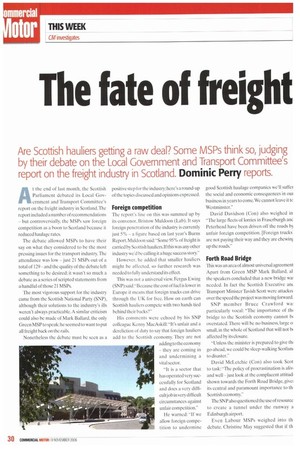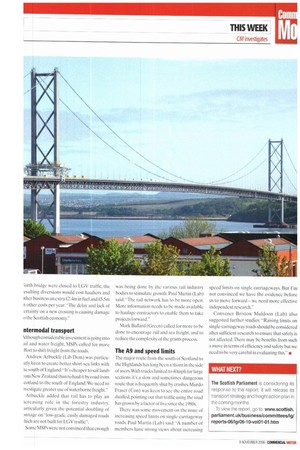The fate of freight
Page 30

Page 31

If you've noticed an error in this article please click here to report it so we can fix it.
Are Scottish hauliers getting a raw deal? Some MSPs think so, judging by their debate on the Local Government and Transport Committee's report on the freight industry in Scotland. Dominic Perry reports.
At the end of last month. the Scottish Parliament debated its Local Government and Transport Committee's report on the freight industry in Scotland.The report included a number of recommendations but controversially. the MSPs saw foreign competition as a boon to Scotland because it reduced haulage rates.
The debate allowed MSPs to have their say on what they considered to be the most pressing issues for the transport industry. The attendance was low -just 21 MSPs out of a total of 129 and the quality of the debate left something to be desired: it wasn't so much a debate as a series of scripted statements from a handful of those 21 MSPs.
'Ille most vigorous support for the industry came from the Scottish National Party (SNP), although their solutions to the industry's ills weren't always practicable. A similar criticism could also be made of Mark Ballard. the only Green MSP to speak: he seemed to want to put all freight back on the rails.
Nonetheless the debate must be seen as a positive step for the industry:here's a round-up of the topics discussed and opinions expressed.
Foreign competition
The report's line on this was summed up by its convenor, Bristow Muldoon (Lab). It says foreign penetration of the industry is currently just 5% a figure based on last year's Burns Report. Muldoon said: "Some 95% of freight is carried by Scottish hauliers. If this was any other industry we'd he calling it a huge success story" However, he added that smaller hauliers 'night be affected. so further research was needed to fully understand its effect.
This was not a universal view. Fergus Ewing (SNP) said:" Because the cost of fuel is lower in Europe it means that foreign trucks can drive through the UK for free. How on earth can Scottish hauliers compete with two hands tied behind their backs?"
His comments were echoed by his SNP colleague Kenny MacAskill:"It's unfair and a dereliction of duty to say that foreign hauliers add to the Scottish economy. They are not adding to the economy they are coming in and undermining a vital sector.
"It is a sector that has operated very successfully for Scotland and does a very difficultjobin very difficult circumstances against unfair competition."
He warned: "If we allow foreign competition to undermine good Scottish haulage companies we'll suffer the social and economic consequences in out business in years to come. We cannot leave it tc Westminster."
David Davidson (Con) also weighed in "The large fleets of lorries in Fraserburgh anC Peterhead have been driven off the roads b) unfair foreign competition. [Foreign trucks. are not paying their way and they are chewint up the roads."
Forth Road Bridge
Ibis was an area of almost universal agreement Apart from Green MSP Mark Ballard, al the speakers concluded that a new bridge wa: needed. In fact the Scottish Executive ant Transport Minister Tavish Scott were attackec over the speed the project was moving forward.
SNP member Bruce Crawford wa: particularly vocal: "The importance of tht bridge to the Scottish economy cannot bt overstated. 'there will be no business, large o small, in the whole of Scotland that will not bt affected by its closure.
"Unless the minister is prepared to give tht go-ahead,we could be sleep-walking Scotlanc to disaster.""
David McLetchie (Con) also took Scot to task: "The policy of procrastination is aliv,
and well just look at the complacent attitud, shown towards the Forth Road Bridge, givei its central and paramount importance to th, Scottish economy.
The SNP also questioned the use of resource to create a tunnel under the runway a Edinburgh airport.
Even Labour MSPs weighed into th debate. Christine May suggested that if th
7orth bridge were closed to LGV traffic, the esulting diversions would cost hauliers and ither business an extra £2,4m in fuel and f5.5m n other costs per year: "The delay and lack of !ertainty on a new crossing is causing damage () t he Scottish economy."
ntermodal transport
Uthough considerable investment is going into ail and water freight. MSPs called for more ffort to shift freight from the roads.
Andrew Arbuckle (Lib Dem) was particuirly keen to create better short-sea links with he south of England: "It's cheaper to sail lamb rom New Zealand than to haul it by road from cotland to the south of England. We need to ivestigate greater use of waterborne freight." Arbuckle added that rail has to play an -tcreasing role in the forestry industry. articularly given the potential doubling of -innage on "low-grade, easily damaged roads ihich are not built for LCIV traffic".
Some MSPs were not convinced that enough was being done by the various rail industry bodies to stimulate growth. Paul Martin (Lab) said: "The rail network has to be more open. More information needs to be made available to haulage contractors to enable them to take projects forward."
Mark Ballard (Green) called for more to be done to encourage rail and sea freight, and to reduce the corn plc \ it y of the grants process.
The A9 and speed limits The major route from the south of Scotland to the Highlands has long been a thorn in the side of users.With trucks limited to 40mph for large sections it's a slow and sometimes dangerous route that is frequently shut by crashes. Murdo Fraser (Con) was keen to see the entire road dualled, pointing out that traffic using the road has grown by a factor of live since the 1980s.
There was some movement on the issue of increasing speed limits on single-carriageway roads, Paul Martin (Lab) said: "A number of members have strong views about increasing speed limits on single carriageways. But I'm not convinced we have the evidence before us to move forward — we need more effective independent research."
Convener Bristow Muldoon (Lab) also suggested further studies: "Raising limits on single-carriageway roads should be considered after sufficient research to ensure that safety is not affected. There may be benefits from such a move in terms of efficiency and safety hut we need to be very careful in evaluating this."






























































































































































































